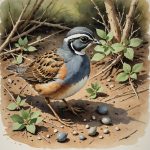Baby quails are delicate creatures that require special care and attention to survive in the wild. If you come across a struggling baby quail, fear not! In this article, we will explore some tips and tricks on how to save a baby quail from dying. From providing warmth to offering the right nutrition, we’ve got you covered. Let’s dive in and learn how to be a quail-saving hero!
Table of Contents
Recognizing Signs of Distress in Baby Quails
When baby quails are in distress, it’s important to act quickly to save them from potential harm. There are several signs to look out for that indicate a baby quail is in distress. One of the most common signs is a lack of movement or activity. If you notice that a baby quail is not moving around or interacting with its surroundings, it might potentially be in distress.
Another sign to watch for is abnormal vocalizations. If a baby quail is making unusual or distressing sounds, it could be a sign that something is wrong. Additionally, if you observe any physical abnormalities such as drooping wings or feathers, it’s important to take action to help the baby quail. By recognizing these signs of distress and acting quickly, you can help save a baby quail from dying.
Creating a Safe and Warm Environment for Baby Quails
If you want to ensure the safety and warmth of your baby quails, there are a few key tips to keep in mind. Firstly,make sure to provide a cozy nesting area for the baby quails to snuggle up in. This can be achieved by using soft,clean bedding such as straw or shredded paper. Additionally, ensure that the nesting area is draft-free to prevent the baby quails from getting cold.
Another important factor in creating a safe environment for baby quails is to provide them with a constant source of warmth. You can achieve this by using a heat lamp or a heat pad placed near their nesting area. It’s essential to monitor the temperature regularly to ensure that it remains at a pleasant level for the baby quails. Remember, creating a safe and warm environment for your baby quails is crucial for their health and well-being.With these tips in mind, you can definitely help ensure that your baby quails thrive and grow into happy, healthy adults.
Feeding and Hydrating a weak Baby Quail
When it comes to saving a weak baby quail from dying, proper feeding and hydration are crucial. It’s important to remember that baby quails have very specific dietary needs, so providing the right nutrition is key to their survival. Here are some tips on how to feed and hydrate a weak baby quail:
- Feed them a high-protein diet: Baby quails need a diet high in protein to help them grow and thrive. Offer them a mix of commercial game bird starter feed and crushed boiled eggs for optimal nutrition.
- Provide fresh water: Make sure the baby quail has access to clean, fresh water at all times. You can use a shallow dish or waterer to make it easier for them to drink.
- Hand-feed if necesary: If the baby quail is particularly weak, you may need to hand-feed them using a dropper or syringe. Make sure the food is at the right temperature and consistency for easy consumption.
| Food | Amount |
|---|---|
| Commercial game bird starter feed | 1 tablespoon |
| Crushed boiled eggs | 1 teaspoon |
Seeking Professional Help if Necessary
If you have tried everything in your power to save a baby quail from dying, but it seems like the situation is not improving, it might be time to seek professional help. Here are some steps you can take if you find yourself in this difficult situation:
- Research veterinarians or wildlife rehabilitation centers in your area that specialize in treating birds.
- Call them to explain the situation and see if they can offer advice or provide immediate care for the baby quail.
- If necessary, schedule an appointment or bring the quail to the professional for further evaluation and treatment.
Remember, seeking professional help is not a sign of weakness, but rather a responsible and compassionate act to ensure the best possible outcome for the baby quail. Don’t hesitate to reach out to experts who have the knowledge and resources to help in situations like this. Trusting their expertise can make a critically important difference in saving the quail’s life.
Q&A
Q: Why shoudl I know how to save a baby quail from dying?
A: Knowing how to save a baby quail can be crucial in emergencies where a young quail might potentially be at risk of dying.
Q: What are some common reasons a baby quail may be at risk of dying?
A: Baby quails are fragile creatures and may be at risk of dying due to lack of proper nutrition, injuries, or exposure to predators.
Q: How can I identify if a baby quail is in distress?
A: Signs of distress in a baby quail may include lethargy, difficulty breathing, or inability to stand or move properly.
Q: What are some immediate steps I can take to save a baby quail from dying?
A: Providing warmth,hydration,and proper nutrition are key steps to saving a baby quail in distress.
Q: what should I do if a baby quail appears to be injured?
A: If a baby quail is injured, it’s important to handle them with care and seek veterinary assistance if needed.
Q: How can I prevent baby quails from ending up in life-threatening situations?
A: By creating a safe and secure environment for baby quails, providing proper nutrition, and monitoring their health regularly, you can definitely help prevent them from facing life-threatening situations.
Concluding Remarks
saving a baby quail from dying may seem like a daunting task, but with patience, care, and rapid thinking, it is possible to give these tiny creatures a fighting chance at survival.Remember to always handle them gently, provide warmth and nourishment, and seek help from a professional if needed. By following these tips and showing compassion towards these delicate birds, we can make a difference in their lives and ensure they grow up healthy and strong. So next time you come across a baby quail in need, don’t hesitate to lend a helping hand and be a hero for these vulnerable little creatures.
Meet Walter, the feathered-friend fanatic of Florida! Nestled in the sunshine state, Walter struts through life with his feathered companions, clucking his way to happiness. With a coop that’s fancier than a five-star hotel, he’s the Don Juan of the chicken world. When he’s not teaching his hens to do the cha-cha, you’ll find him in a heated debate with his prized rooster, Sir Clucks-a-Lot. Walter’s poultry passion is no yolk; he’s the sunny-side-up guy you never knew you needed in your flock of friends!





